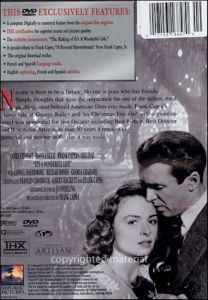Now perhaps the most beloved American film,
It's a Wonderful Life was largely forgotten for years, due to a copyright quirk. Only in the late 1970s did it find its audience through repeated TV showings. Frank Capra's masterwork deserves its status as a feel-good communal event, but it is also one of the most fascinating films in the American cinema, a multilayered work of Dickensian density. George Bailey (played superbly by James Stewart) grows up in the small town of Bedford Falls, dreaming dreams of adventure and travel, but circumstances conspire to keep him enslaved to his home turf. Frustrated by his life, and haunted by an impending scandal, George prepares to commit suicide on Christmas Eve. A heavenly messenger (Henry Travers) arrives to show him a vision: what the world would have been like if George had never been born. The sequence is a vivid depiction of the American Dream gone bad, and probably the wildest thing Capra ever shot (the director's optimistic vision may have darkened during his experiences making military films in World War II). Capra's triumph is to acknowledge the difficulties and disappointments of life, while affirming--in the teary-eyed final reel--his cherished values of friendship and individual achievement.
It's a Wonderful Life was not a big hit on its initial release, and it won no Oscars (Capra and Stewart were nominated); but it continues to weave a special magic.
--Robert Horton
